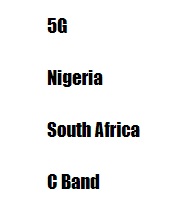
According to the Star Times Nigeria on twitter:
reports and analysis.
Currently we are firmly coordinating with ICASA to solve the technical problems resulted from signal interference.https://t.co/QjeulBKBhW
We sincerely apologize for any inconvenience caused.
StarTimes Group
— StarTimes Nigeria (@StarTimes_Ng) October 11, 2019
“Please note that the ongoing 5G signal test in South Africa has been seriously influencing our satellite transmission in the C band frequency. According to the investigation and confirmation of ICASA (Independent Communications Authority of South Africa), the 5G signal test sites are in short distance, therefore our site base has been severely interfered by the operation of 5G provider nearby. As such, some channels including FOX, FOX LIFE, FOX SPORTS, FOX SPORTS 2, NGW E,NGC E, BABY TV are unable to be broadcast normally.
According to the World Broadcasting Union, reallocating C-Band frequencies to other services such as 5G can lead to insufficient C-Band spectrum remaining available for broadcasters’ use, existing distribution and collections systems may be compromised, especially in countries with equatorial geography and high rainfall. In addition, other industry associations and international satellite communication services providers including the National Association of Broadcasters of South Africa, Intelsat and SES have identified the same perspective in relevant reports and analysis.
Currently we are firmly coordinating with ICASA to solve the technical problems resulted from signal interference.” advanced-television.com/2019/09/23/wbu
WBU concerns over C-band re allocation
By Chris Forrester
September 23, 2019
The World Broadcast Unions (WBU) – in the light of initiatives by the FCC in the US, Ofcom in the UK, and other national administrations concerning potential C-Band Broadcast Spectrum (3.7 to 4.2 MHz) reassignment for 5G – is expressing their concerns over programme collection and distribution and the potential impact on hundreds of millions of viewers around the world.
C-band spectrum in many nations is being repurposed from satellite usage to 5G telecommunications use.
The WBU, in a statement said: “With insufficient C-Band spectrum remaining available for broadcasters’ use, existing distribution and collections systems may be compromised, especially in countries with equatorial geography and high rainfall. Additionally, reallocating C-Band frequencies to other services may, over time, increase pressure on the remaining uplink band further limiting its use and compromising existing C-Band users and service reliability, increasing costs to the broadcast community.”
The WBU reminded regulators that C-band is the international work-horse for the distribution of Television, Radio and other content by broadcasters and other media industries, with millions of professional downlinks and corresponding uplinks in use nationally and internationally and over one hundred million C-Band TV receive only antennas in use worldwide (including B2B, internet and direct-to-home satellite).
“The WBU contends that any consideration of reallocating C-Band spectrum is a serious issue with technical, economic and service implications,” said Michael McEwen, Head, WBU Secretariat. “Detailed impact studies involving all stakeholders need to be undertaken to fully understand the consequences before such a reallocation takes place.”
However, the WBU might be a little late in its concerns as many nations have already made the decision to reallocate spectrum.
Also, the FCC is actively looking at permitting C-band restructuring by satellite operators over the US.
The WBU stated: “The recent regulatory Inquiries by the US FCC on the potential reallocation of some of the existing C-Band downlink allocation (for 5G services) is a concern for the members of the WBU. Given the ubiquitous use of C-Band spectrum around the world and its potential to provide new services, such US regulatory activity will likely be pursued by other Administrations. Any subsequent proposals to globally harmonize the use of these frequencies above 3600 MHz for IMT, argued for on the basis of national reallocations, do not reflect the realities of global satellite service usage.”
“In addition, in the event some of the downlink C-Band spectrum is reallocated, the associated “twinned” uplink C-Band frequencies may eventually be reallocated to other services. Over time, such a reallocation might further increase pressure on the remaining uplink band, further limiting its use. In all likelihood, harm will be done to existing C-Band users and the solutions will compromise service reliability and increase the costs to the broadcast community,” added the WBU.
The broadcasting unions who belong to the WBU are the Asia-Pacific Broadcasting Union (ABU), the Arab States Broadcasting Union (ASBU), the African Union of Broadcasting (AUB), the Caribbean Broadcasting Union (CBU), the European Broadcasting Union (EBU), the International Association of Broadcasting (IAB/AIR) and the North American Broadcasters Association (NABA). https://advanced-television.com/2019/09/23/wbu-concerns-over-c-band-reallocation/
EMFSA: March 2019
Is Rain using a satellite spectrum for its 5G Network in South Africa?
